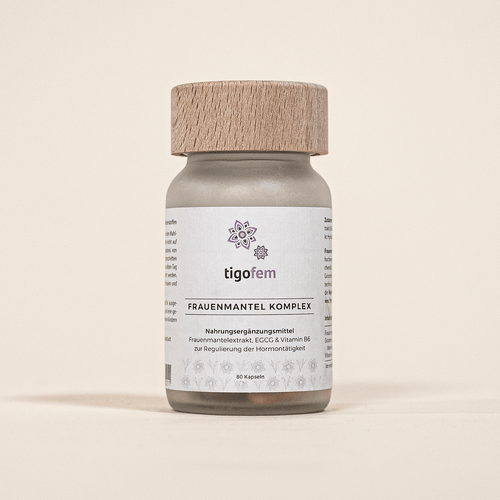Themen dieses Blogartikels:
Table of contents
- What are hormones and what function do they have in the body?
- Do men and women have different hormones?
- The sex hormones testosterone and oestrogen
- Further important hormones
- Hormones and their influence on the menstrual cycle in women
- Is there a male cycle?
- How the hormone cycle changes over the course of a lifetime
- Hormones in children and teenagers
- Menopause in women
- Do men go through the menopause?
- Tips: How to keep your hormone levels in balance
- Bibliography
What are hormones and what function do they have in the body?
Hormones are messenger substances that function like a messenger app: The body uses them for communication between cells and organs. Many hormones are produced in endocrine glands. These include the pancreas, thyroid gland, pituitary gland and hypothalamus, as well as the adrenal gland, testicles and ovaries. From there, the hormones enter the bloodstream.
Do men and women have different hormones?
There are some differences between men and women - but hormones are not one of them. All people produce the same hormones. This also applies to sex hormones. The difference lies in the concentration: the female body produces more oestrogen, the male body more testosterone.
The sex hormones testosterone and oestrogen
Testosterone and oestrogen play an important role during puberty or pregnancy, but also in adolescence and old age.
- The sex hormone testosterone is involved in muscle building and stimulates the growth of body hair. It is one of the androgens, i.e. the male sex hormones, which are mainly produced in the testicles - but also in glands in the female body.
- Oestrogens, which include oestradiol, oestrone and oestriol, are the most important female sex hormones. They stimulate the growth of the mammary glands and control the female menstrual cycle. Their counterpart is progesterone. It also occurs in the male body. In this case, it is not the female sex organs that are responsible for production, but the adrenal cortex, for example.
Further important hormones
In addition to sex hormones, there are many other hormones in the body. Here are some of the most important hormones and their effects:
- Melatonin is a hormone that regulates your body's sleep-wake cycle and makes you feel tired in the evening
- Cortisol is a stress hormone that regulates the metabolism, increases blood sugar levels and helps to inhibit inflammation. It helps you to perform well in stressful situations
- Insulin regulates blood sugar levels by promoting the uptake of glucose into the cells
- Like cortisol, adrenaline is a stress hormone and provides the body with energy in stressful situations
- Oxytocin is also known as the cuddle hormone, as it can reduce stress and strengthen the bond between people. It also stimulates labor during childbirth
Hormones and their influence on the menstrual cycle in women
Hormones accompany women throughout the menstrual cycle, which prepares the body for pregnancy. The pituitary gland releases FSH (follicle-stimulating hormone) and LH (luteinizing hormone) for this purpose.
FSH promotes the development of follicles in the ovaries, which are important for the production of oestrogen. Among other things, it is needed to rebuild the lining of the uterus after menstruation and to support egg maturation.
After ovulation triggered by LH, the mature egg moves into the fallopian tube where it produces the hormone progesterone, which prepares the lining of the uterus for the implantation of a fertilized egg. If fertilization does not occur, the level of progesterone drops again and menstrual bleeding begins.
The ups and downs of hormones are considered a trigger for premenstrual syndrome (PMS), which is associated with fatigue or irritability, among other things.2
Hormones are also very important during pregnancy. For example, increasing concentrations of progesterone prepare the breast to be able to produce milk. And human chorionic gonadotropin (hCG) fulfills pregnancy-preserving tasks.
Anzeige
- Speziell für Frauengesundheit & das Hormonsystem entwickelt
- Mit den Premium Naturstoffen Ashwagandha, Grüntee-Extrakt (EGCG), Astaxanthin & Dong Quai
- Ergänzt durch Vitamin B6 & Pantothensäure zur Hormonregulierung
- Ohne Füllstoffe oder Aromen
- Mit Ärzten & Experten entwickelt
- Leckerer Geschmack
- Leicht dosierbares Flüssigprodukt

Is there a male cycle?
You thought the hormonal cycle was only for women? In fact, there is also a male cycle. However, it doesn't last a month, just 24 hours. Testosterone levels change over the course of the day, affecting performance and mood:
- In the morning, testosterone levels are particularly high. Energy levels are at their peak. Testosterone is also noticeable in the form of a daily urge or desire for sex
- By midday, testosterone has leveled off and slowly decreases. The midday hours are therefore rather calm and relaxed
- In the evening, testosterone levels reach their lowest point. At the same time, the level of oxytocin increases and with it the need for cuddling. In addition, the testosterone now makes way for tiredness
Incidentally, men can also have something like PMS. However, they are referred to as IMS - Irritable Male Syndrome, which means "irritable man syndrome. "3
How the hormone cycle changes over the course of a lifetime
For most of our lives, the body goes through the male or female hormonal cycle relatively regularly. But what does it look like before menstruation and during the menopause - and does the menopause actually exist in men too?
Hormones in children and teenagers
In humans, hormones already play an important role in the womb. For example, they influence the development of organs and bone growth. They also influence the development of the nervous system and the growth of children.
During puberty, the influence of hormones can hardly be overlooked. Testosterone and oestrogen in particular are involved in numerous changes that the body undergoes during this important phase of life. Boys' voices become deeper, girls' breasts grow, their hips develop, their menstrual cycle begins and their bodies reach sexual maturity.
Menopause in women
With the menopause, women experience further major hormonal changes. From around the mid-40s, the function of the ovaries slowly declines and with it the production of oestrogens and progesterone. The reason: the number of follicles is limited and steadily decreases. This phase is called the perimenopause. Some women complain of hot flushes or sleep disorders during this time.
Regular menstrual bleeding ends around the mid-50s. The last period, which is not followed by any more for a year, is called the menopause. This is when the body adjusts to a new hormonal balance. The time after the menopause is called the postmenopause.4
Do men go through the menopause?
Men also experience hormonal changes as they get older. The effects are less drastic than for women. Nevertheless, we can still talk about the male menopause. While oestrogen levels fall in women, testosterone levels fall in men. The decrease in testosterone levels leads to a decrease in sex drive or listlessness, among other things.5
Tips: How to keep your hormone levels in balance
Hormones are with you from birth. Enough time to learn to better understand and regulate the most important hormones in order to avoid hormone fluctuations and the associated complaints. If you want to prevent a testosterone deficiency, for example, which can cause hormonal imbalances, you should focus on a conscious lifestyle with a balanced diet, plenty of exercise and little alcohol, obesity and smoking.
Women's hormonal cycles are somewhat more complex. However, they can also help to ensure that everything is in balance hormonally. If you would like to know what effects the sex hormone oestrogen has on your monthly cycle and how to regulate hormones naturally, you can find a detailed article on the topic of cycle nutrition in our blog.
Now and in the future, you can ensure that your hormones remain in balance for as long as possible and that you can enjoy life to the full. We're here to support you: our knowledge blog offers tips on how to provide your body with important nutrients and optimize your training plan.
This article is based on carefully researched sources:
Bibliography
- Kraenzlin M, Meier C. Sex hormones and bone. Ther Umsch. 2014;71(4):209-219. doi:10.1024/0040-5930/a000504
- Pope CJ, Oinonen K, Mazmanian D, Stone S. The hormonal sensitivity hypothesis: A review and new findings. Med hypotheses. 2017;102:69-77.
doi:10.1016/j.mehy.2017.03.012 - Lincoln GA. The irritable male syndrome. Reprod Fertil Dev. 2001;13(7-8):567-576. doi:10.1071/rd01077
- Peacock K, Carlson K, Ketvertis KM. Menopause. In: StatPearls. Treasure Island (FL): StatPearls Publishing; December 21, 2023.
- Fessler B. Testosterone makes the man. MMW Fortschr Med. 2024;166(7):65. doi:10.1007/s15006-024-3861-z
- Kische H, Arnold A, Gross S, et al. Sex Hormones and Hair Loss in Men From the General Population of Northeastern Germany. JAMA Dermatol. 2017;153(9):935-937. doi:10.1001/jamadermatol.2017.0297





